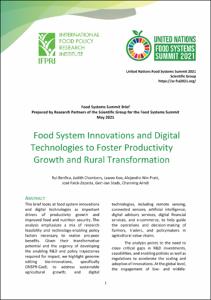Food System Innovations and Digital Technologies to Foster Productivity Growth and Rural TransformationFood Systems Summit Brief Prepared by Research Partners of the Scientific Group for the Food Systems Summit May 2021

Food System Innovations and Digital Technologies to Foster Productivity Growth and Rural Transformation
Food Systems Summit Brief Prepared by Research Partners of the Scientific Group for the Food Systems Summit May 2021

| dc.contributor.author | Benfica, Rui | |
| dc.contributor.author | Chambers, Judith | |
| dc.contributor.author | Koo, Jawoo | |
| dc.contributor.author | Nin-Pratt, Alejandro | |
| dc.contributor.author | Falck-Zepeda, José | |
| dc.contributor.author | Stads, Gert-Jan | |
| dc.contributor.author | Arndt, Channing | |
| dc.date.accessioned | 2021-06-10T13:43:06Z | |
| dc.date.available | 2021-06-10T13:43:06Z | |
| dc.date.issued | 05.2021 | |
| dc.identifier.uri | https://hdl.handle.net/20.500.11811/9134 | |
| dc.description.abstract | This brief looks at food system innovations and digital technologies as important drivers of productivity growth and improved food and nutrition security. The analysis emphasizes a mix of research feasibility and technology-enabling policy factors necessary to realize pro-poor benefits. Given their transformative potential and the urgency of developing the enabling R&D and policy trajectories required for impact, we highlight genome editing bio-innovations, specifically CRISPR-Cas9, to address sustainable agricultural growth; and digital technologies, including remote sensing, connected sensors, artificial intelligence, digital advisory services, digital financial services, and e-commerce, to help guide the operations and decision-making of farmers, traders, and policymakers in agricultural value chains. The analysis points to the need to close critical gaps in R&D investments, capabilities, and enabling policies as well as regulations to accelerate the scaling and adoption of innovations. At the global level, the engagement of low- and middle-income countries with global players should be facilitated so as to strengthen intellectual property (IP) access and management of innovations; and North-South, South-South, and triangular cooperation should be promoted to strengthen LMICs’ regulatory capabilities. At the national level, countries need to invest in science-based participatory approaches to identify and adapt technologies to local conditions; close regulatory gaps through evidence-based frameworks that enable the rapid development, deployment, and safe use of innovations; close institutional and human capacity gaps by addressing limitations in institutional capacities and coordination, while training a new generation of scientists with the skills needed to develop and deliver innovations; develop an understanding of political economy factors for a nuanced knowledge of actors’ agendas to better inform communications and address technology hesitancy; close digital infrastructure gaps in rural areas by promoting simultaneous investments in digital infrastructure and electrification, reducing data costs, and improving digital literacy; and develop sustainable business models for digital service providers to help them achieve profitability, interoperability, and scale to reach a sustainable critical mass, and thus facilitate the adoption of food systems innovations. | en |
| dc.format.extent | 19 | |
| dc.language.iso | eng | |
| dc.rights | In Copyright | |
| dc.rights.uri | http://rightsstatements.org/vocab/InC/1.0/ | |
| dc.subject | Food systems | |
| dc.subject | Technologies | |
| dc.subject | Innovations | |
| dc.subject | Rural development | |
| dc.subject.ddc | 333.7 Natürliche Ressourcen, Energie und Umwelt | |
| dc.title | Food System Innovations and Digital Technologies to Foster Productivity Growth and Rural Transformation | |
| dc.title.alternative | Food Systems Summit Brief Prepared by Research Partners of the Scientific Group for the Food Systems Summit May 2021 | |
| dc.type | Wissenschaftlicher Artikel | |
| dc.identifier.doi | https://doi.org/10.48565/scfss2021-6180 | |
| dc.publisher.name | Center for Development Research (ZEF) in cooperation with the Scientific Group for the UN Food System Summit 2021 | |
| dc.publisher.location | Bonn | |
| dc.rights.accessRights | openAccess | |
| dc.relation.url | https://sc-fss2021.org/wp-content/uploads/2021/06/FSS_Brief_Food_System_Innovations_Digital_Technologies.pdf | |
| ulbbn.pubtype | Zweitveröffentlichung | |
| dc.version | updatedVersion |
Files in this item
This item appears in the following Collection(s)
-
FSS Briefs by Partners of Scientific Group (41)
"Food Systems Summit Briefs" are invited papers by the Scientific Group in support of the Summit agenda setting.




